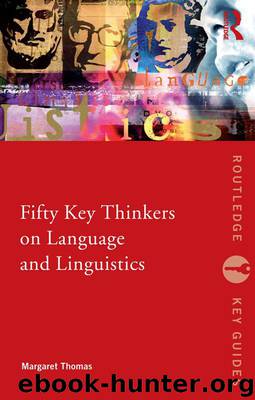Fifty Key Thinkers on Language and Linguistics (Routledge Key Guides) by Thomas Margaret

Author:Thomas, Margaret [Thomas, Margaret]
Language: eng
Format: epub
Publisher: Routledge
Published: 2012-04-26T16:00:00+00:00
Otto Jespersen (1860–1943)
The Danish scholar Otto Jespersen published his autobiography in 1938 under the title En Sprogmands Levned , literally ‘A Language-man’s Life ’. The Foreword to the English edition points out that the Danish word ‘sprogmand ’ is not really equivalent to either ‘philologist’ or ‘linguist’. Although the translator adopted the latter term, it seems fitting that this independent-minded scholar’s self-representation does not fall into any established category. Personally, Jespersen led a conventional life for a successful European academic and administrator in the early twentieth century. But intellectually, his allegiance was not to any school, approach or topic. Rather, Jespersen was a self-defined ‘language-man’, who had the good fortune to be able to follow his broad and boundary-crossing curiosity about language into many subfields, and to freely develop his many creative and original insights. Randolph Quirk (b. 1920), in the Foreword to the tenth edition of Jespersen (1905/1982), depicted him as ‘indeed the most distinguished scholar of the English language who has ever lived’.
Jespersen’s upbringing encouraged independence. The seventh of ten children born to a family of lawyers and public servants in Jutland ( the westernmost, peninsular portion of Denmark), he was orphaned at age 13. To attend school, he moved to a town northwest of Copenhagen, where his Jutland dialect was the object of ridicule. Jespersen worked his way through the University of Copenhagen with the help of relatives, scholarships and part-time jobs (principally as a language tutor but also as shorthand stenographer in the Danish Parliament). After completing almost four years of courses in Law, he abruptly abandoned that field to embark on the riskier, less practical study of languages. As a result, it took him a decade to obtain a Master’s degree, in French. Those extra years probably fixed Jespersen’s habits of wide and self-motivated study of Germanic and other European languages, and of phonetics, comparative-historical linguistics, and language teaching. Jespersen’s attenuated student life also gave him time to establish personal contacts with linguists all over Europe, to become active in professional societies and informal study groups, and to solidify his attachment – albeit often a critical one – to the University of Copenhagen. These experiences sustained him throughout his life.
After a year of travel, during which he studied in Berlin and met (among others) phoneticians Henry Sweet in England and Paul Passy (1859–1940) in France, Jespersen submitted a doctoral dissertation on English grammatical case. Two years later, in 1893, he was appointed Copenhagen’s first regular professor of English language and literature. He married in 1897 and raised a son, Frans. Jespersen travelled throughout Europe and spent nine months lecturing in the United States in 1909 (at Berkeley and Columbia). Otherwise, his entire career was played out at the University of Copenhagen, as professor, dean and eventually vice chancellor.
A number of interconnected themes emerge in Jespersen’s wide-ranging work. Two of his first and most formative interests were phonetics and foreign language teaching. He combined them in urging (along with Sweet, Passy, and the Germans Felix Franke
Download
This site does not store any files on its server. We only index and link to content provided by other sites. Please contact the content providers to delete copyright contents if any and email us, we'll remove relevant links or contents immediately.
Cecilia; Or, Memoirs of an Heiress — Volume 1 by Fanny Burney(32544)
Cecilia; Or, Memoirs of an Heiress — Volume 2 by Fanny Burney(31942)
Cecilia; Or, Memoirs of an Heiress — Volume 3 by Fanny Burney(31928)
The Lost Art of Listening by Michael P. Nichols(7488)
Asking the Right Questions: A Guide to Critical Thinking by M. Neil Browne & Stuart M. Keeley(5757)
We Need to Talk by Celeste Headlee(5608)
On Writing A Memoir of the Craft by Stephen King(4928)
Dialogue by Robert McKee(4386)
Pre-Suasion: A Revolutionary Way to Influence and Persuade by Robert Cialdini(4218)
I Have Something to Say: Mastering the Art of Public Speaking in an Age of Disconnection by John Bowe(3872)
Elements of Style 2017 by Richard De A'Morelli(3339)
The Book of Human Emotions by Tiffany Watt Smith(3300)
Fluent Forever: How to Learn Any Language Fast and Never Forget It by Gabriel Wyner(3077)
Name Book, The: Over 10,000 Names--Their Meanings, Origins, and Spiritual Significance by Astoria Dorothy(2978)
Why I Write by George Orwell(2944)
Good Humor, Bad Taste: A Sociology of the Joke by Kuipers Giselinde(2941)
The Art Of Deception by Kevin Mitnick(2796)
The Grammaring Guide to English Grammar with Exercises by Péter Simon(2737)
Ancient Worlds by Michael Scott(2682)
